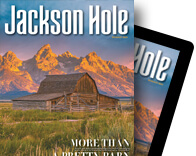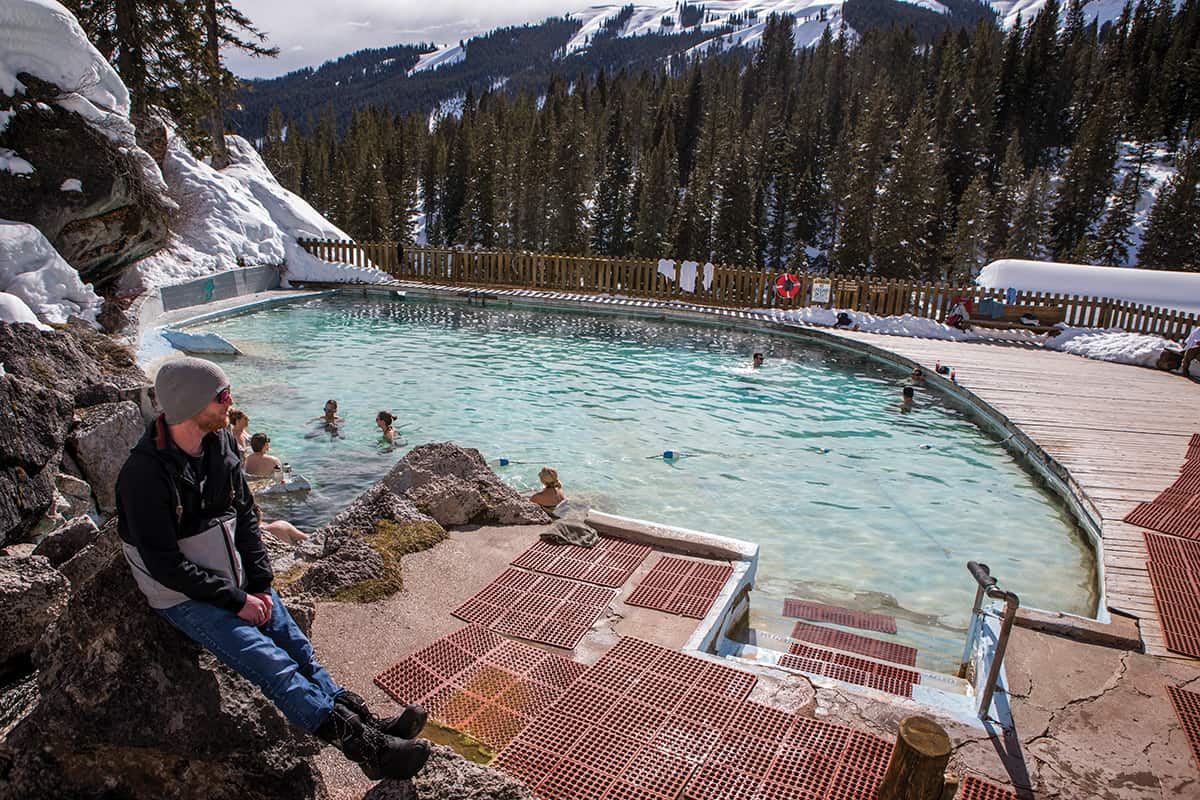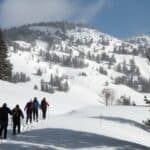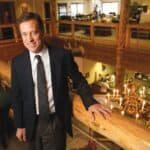Read The
Current Issue
A Winter Keeper’s Wild World
The manager of Granite Hot Springs lives a life of isolation, minus six busy hours every day.
By Mike Koshmrl // Photography by Amber Baesler

As caretaker of Granite Hot Springs, Jeremy Hunn lives at the historic natural hot pool and empties and cleans the pool every night.
JEREMY HUNN IS foggy headed. A pesky pine marten kept him up much of the night. The sleek, weasel-like pine forest dwellers are a rare treat for most people to see in the wild, but Hunn’s relationship with them is well past the honeymoon phase. “They’re called the cutest assassins,” Hunn says. In the very early hours of the March day I visit him, one of these assassins had been noisily rummaging through bags full of towels and cans left on a deck of the two-floor Granite Hot Springs cabin. Its mischief was repeated and repeated, and happening just feet away from where Hunn was trying to sleep. “I’d scare him off, and go back to sleep,” he says. “Then he’d come back every half an hour. He did that from midnight until 3 in the morning. I finally got him out of there, or I was so out of it I just slept through.”
As Hunn speaks, tourists stewing in the 108(ish) degree Fahrenheit geothermally heated, Civilian Conservation Corps-built hot pool inch their way toward another marten. It scampers into a fissure in the snowpack that surrounds much of the pool, and then quickly takes off. Only a few minutes lapse before another species of mischievous wildlife catches Hunn’s eye. “Who has the yellow backpack down there?” he calls down to a family enjoying the pool. A raven has opened this pack up and, perched atop it, is enjoying eating some of the spinach salad formerly hidden inside the bag. Hunn sends the raven skyward by simply reaching for a snowball—he doesn’t even need to throw it. Both the 27-year-old winterkeeper and the raven have played this game before.
This is a solo gig that brings Jeremy Hunn to a special place nestled along a scenic mountain stream at the southern foot of the Gros Ventre Range. He’s there every other week, throughout the winter, living a life he “never would have imagined.”
Dealing with martens and ravens are an aside of Hunn’s job, of course. For the past five winters, his professional duties are to keep up and manage the historic Granite Hot Springs pool. This is a solo gig that brings him to a special place nestled along a scenic mountain stream at the southern foot of the Gros Ventre Range. He’s there every other week, throughout the winter, living a life he “never would have imagined.” (He relocated to the area from the Central Valley of California.) Hunn’s grandfather, Steve, owns the company Aud and Di Campground Services that won the contract for managing campgrounds in the Bridger-Teton National Forest. Part of the package is this commercial hot springs 34 miles from Jackson’s Town Square. In summer, you can drive all 34 of these miles—the last 10 miles are a gravel road—but, come winter, these last 10 miles are not plowed. The road is snowpacked and groomed, making Granite Hot Springs accessible only via skis, snowmobiles, or on the back of one of Frank Teasley’s many dog sleds (book the last via Jackson Hole Iditarod Sled Dogs Tours).
HUNN’S WINTERKEEPER ROUTINE starts in the early morning, when he rises to shovel snow and ready the site and springs for visitors. Once guests arrive, he transitions to people-pleasing for six-plus straight hours. Being the sole employee on premises, he’s a one-stop shop for customer service—playing cashier, cleaning changing rooms, and making sure people respect the rules, like no alcohol. On a typical winter weekday, this is a manageable job, because there are perhaps only about twenty guests a day. On bluebird weekend days though, the crowd can swell to around one hundred. On the busiest of holidays, it’s total mayhem; Hunn says 250-people days aren’t unheard of.
And then there are the days when Hunn gets few guests. Avalanches that sweep over the highway and close down the Hoback Canyon have kept guests out for days at a time. There’s also the potential for huge amounts of snowfalls that deter people from making the 10-mile oversnow trek. In the big winter of 2016-17, a snow gauge near Granite Hot Springs logged 800 inches, Hunn says, and there were times when 4-foot dumps kept people away for days. Hunn enjoys these days, and says that sometimes the isolation gets truly isolating. “When I’m up here, I’m up here all the time,” he says. “There’s no chance to leave.” In his seven days off, Hunn lives in Alpine.
Being the sole employee on premises, he’s a one-stop shop for customer service—playing cashier, cleaning changing rooms, and making sure people respect the rules, like no alcohol.
There are a few old-timers with bad backs who routinely visit the hot springs to soak, but otherwise the majority of Hunn’s guests are tourists that fly into Jackson Hole, mixed with Wyoming, Idaho, and Utah residents who drive to the area. Occasionally, local celebrities make an appearance. “Travis Rice, for one of his snowboard videos, once rode down the pillow-tops and landed in the pool,” Hunn says. (Rice is a Jackson-born professional snowboarder who was named the best contemporary snowboarder in the world by Red Bull in 2013.)
GRANITE HOT SPRINGS has a rich and deep history. Manipulation of the flow to form the pool dates to a Civilian Conservation Corps (CCC) project more than eighty years ago. One longtime winterkeep was Hoback resident and outfitter Gap Pucci, who chronicled his decades managing the pool in his 2011 book, We Married Adventure. Hot springs enthusiasts with little interest in the official hours of operation were a major problem back in the day. “One night about 80 hippies descended on the springs and what could we do?” Pucci wrote. “We tried calling the sheriff after driving 20 miles and no one showed.”
Though Hunn has at times dealt with similar overeager soakers, his best line of defense happens after the last paid customers leave for the day. He cranks a valve lefty-loosy on a headgate that sends thousands of gallons roaring into a gully that feeds into nearby Granite Creek. Fifteen minutes later, the pool is empty, and it remains in a partially full state for the next twelve hours. (It is fully filled again only a few hours before the next day’s guests arrive.) This tactic clears out debris and bacteria, dissuades pool poachers, and ensures the water is as hot as possible (temperatures vary by season, peaking near 110 degrees in the winter).
ON THE MARCH day I visit, the last of the hot-potting guests depart right at closing, 5 p.m. Silence and running water replace the banter of families and screams of kids. With guests gone, whether because the pool or roads are closed, Hunn’s animal friends keep things interesting. Once, while snowmobiling out with his dad, he came around a corner and startled a raptor that had a red squirrel clenched in its talons. “I scared [the raptor], and he dropped [the squirrel].” Hunn says. The squirrel free-fell out of the sky. “It was unbelievable. He didn’t kill it, and it ran off.”
Then there are the ornery moose that don’t want to leave the ease of travel offered by the snowpacked road and nearby trails, no matter how many skiers, dog sleds, or snowmobiles they’re holding up. And, of course there are the misbehaving martens, which at times were so numerous that Hunn live-trapped and relocated them (to a spot down the road, away from his sleeping quarters). Hunn says there probably aren’t many jobs with responsibilities like his. JH

Hunn drains, sanitizes, and scrubs the bottom of the pool.

Hunn drains, sanitizes, and scrubs the bottom of the pool.





